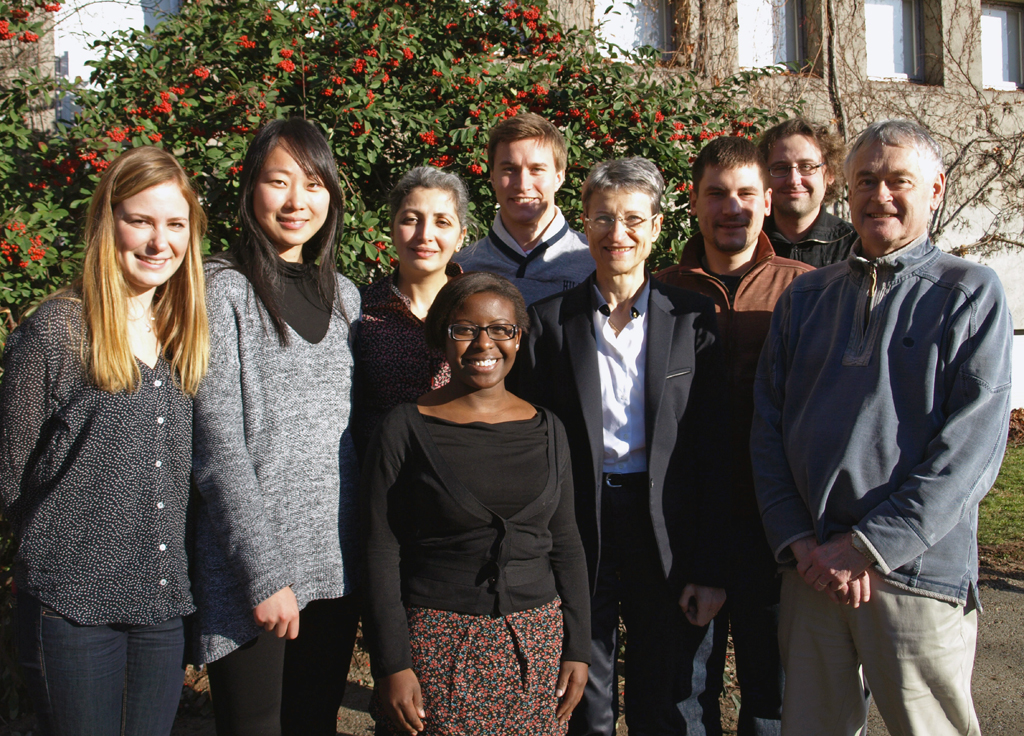Immunobiology and therapy in lupus
Institut de Biologie Moléculaire et CellulaireCNRS UPR3572 Immunopathologie et Chimie Thérapeutique
15 rue René Descartes
67000 Strasbourg
France - Strasbourg
Site web - S.Muller@ibmc-cnrs.unistra.fr -
Principal investigator
Sylviane Muller

Research themes
Since its creation in 1993, our laboratory relies on a strong fundamental research to develop innovative translational research. The thematic area of our laboratory that is composed of ~60 people in 2014 is focused on autoimmunity, and more particularly on systemic lupus erythematosus, which is a deregulation of the immune system that reacts inappropriately against healthy organs of the host, instead of restricting its action towards infectious pathogens or unhealthy/transformed host cells. One of our challenges is to develop new therapeutic strategies to treat lupus, that would be efficient and specific, and devoid of undesirable, and sometimes particularly aggravating, secondary effects of currently used medications. Our laboratory gets benefit of teams with a large panel of expertise, going from in silico molecular studies to lupus patients, and including organic chemistry, functional genetics, cell biology, molecular immunology, pharmacology, imaging, clinical research; all with one main objective, which is to understand and efficiently treat SLE. Our multidisciplinarity is central to generate truly new ideas and biological concepts.
In this context, we identified a peptide called P140, which reduces the biological and clinical defaults of SLE, both in model mice and in patients. While deciphering the molecular mechanisms relying on P140 mode of action, the team found HSPA8/HSC70, a major chaperone of the chaperone-mediated autophagy (CMA) and macroautophagy (MaA) processes, as being a main target of P140. As a consequence, the team actively works on the molecular, cellular and physiological links between autophagy and lupus, a field in which everything remains to be done. Today, we focus on two main axes:
Macroautophagy and (auto)immunity
We investigate the role of MaA in the biology of lymphocytes, and how MaA impacts on the development of SLE. We recently described a deregulation of MaA in the lymphocytes of both mice and human developing lupus. We use mouse models susceptible or resistant to the development of systemic autoimmunity and which are deficient for autophagy in T or B lymphocytes. This approach allows us to evaluate at a fundamental level the function of autophagy in lymphocytes in the course of the development of a normal or a pathological humoral response. We hope to identify new therapeutic targets to treat lupus, and eventually which will be beneficial to other autoimmune pathologies and cancer.
Chaperone-mediated autophagy and lupus
Following very promising biological and clinical results obtained in clinical trials, which showed a real advantage at using P140/Lupuzor in therapies to treat lupus patients, our current research is focused on improving our understanding of how P140 acts both in human and mice. What is the influence of the phosphorylation of the sequence 131-151 of P140, knowing that the non-phosphorylated peptide has no therapeutic effects ? Is the residue Ser140 of the 131-151 sequence of P140 modified in vivo ? How the peptide P140 enters within cells ? Where does it traffic within cells ? Following its interaction with HSPA8, is there a key factor of the intracellular signaling which is modified ? Is the impact on MaA, CMA or on other forms of autophagy direct or indirect ? Does P140 restore autophagy-linked mechanisms in lupus ? Does P140 interfere with MHC peptide presentation ? All these questions, and much more others, will be investigated for a better understanding and treatment of lupus.
Publications
Page N., Gros F., Schall N., Décossas M., Bagnard D., Briand J.-P. & Muller S. (2011) HSC70 blockade by the therapeutic peptide P140 affects autophagic processes and endogenous MHCII presentation in murine lupus. Ann. Rheum. Dis. 70:837-843.
Page, N., Gros, F., Schall, N., Briand, J.-P. & Muller, S. (2011) A therapeutic peptide in lupus alters autophagic processes and stability of MHCII molecules in MRL/lpr B cells. Autophagy 7:539-540.
Gros, F., Arnold, J., Page, N., Décossas, M., Korganow, A.-S., Martin, T. & Muller, S. (2012) Macroautophagy is deregulated in murine and human lupus T lymphocytes. Autophagy 8:1113-1123.
Schall, N., Page, N., Macri, M., Chaloin, O., Briand, J.-P. & Muller, S. (2012) Peptide-based approaches to treat lupus and other autoimmune diseases. J. Autoimmunity 39: 143-153.
Stricher, F., Macri, C., Ruff, M. & Muller, S. (2013) HSPA8/HSC70 chaperone protein: structure, function and chemical targeting. Autophagy 9:1937–1954.
Muller, S. & Wallace D.J. (2014) The importance of implementing proper selection of excipients in lupus clinical trials. Lupus, in press
Composition de l'équipe
F. Gros, MCU UdS, F.Gros@ibmc-cnrs.unistra.fr
J.-P. Briand, DR2 CNRS
H. Dali, Tcn CNRS
N. Schall, IE CDI
F. Wang, Post-doctorante
J. Arnold, Doctorant
D. Murera, Doctorante
M. Wilhelm, Doctorant